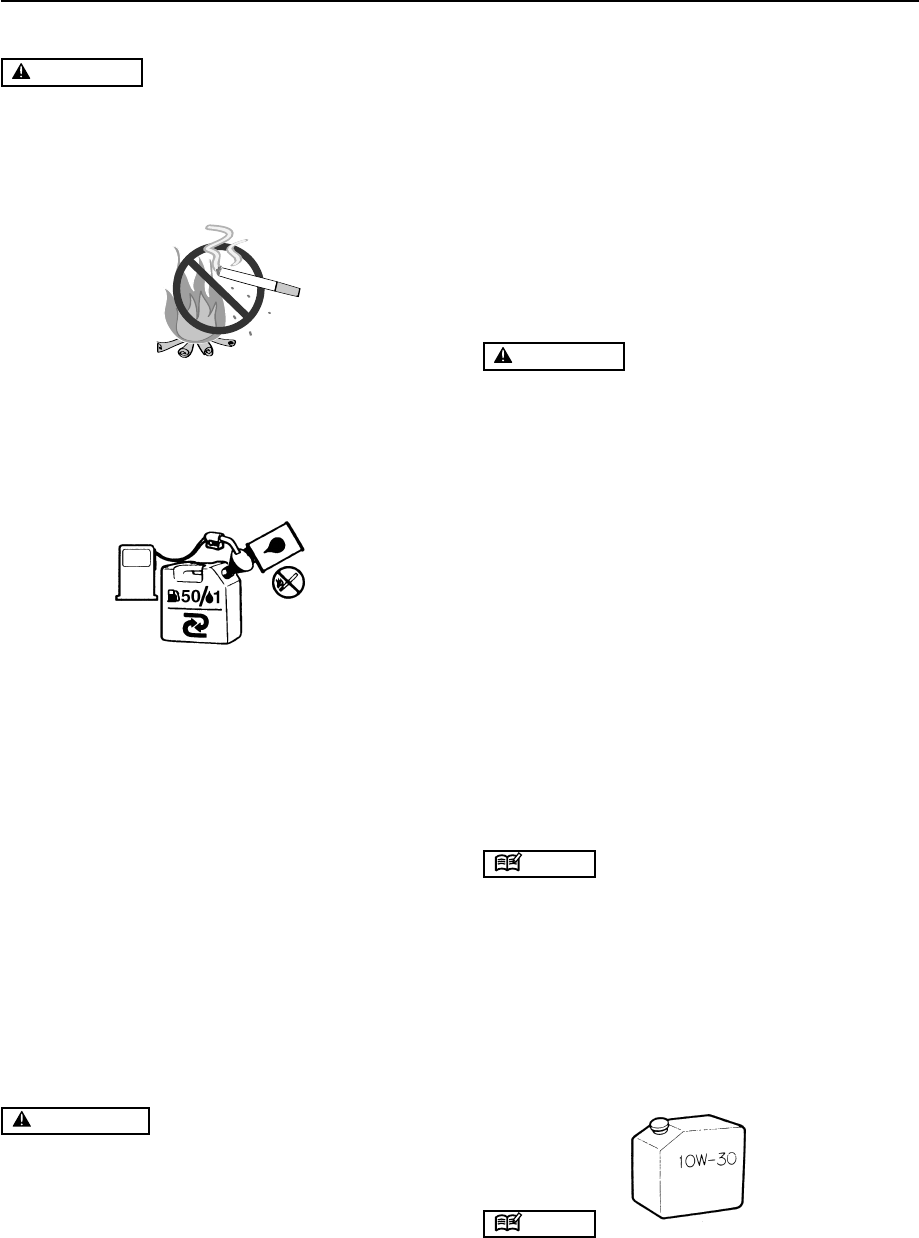
G3700
GB-8
4. Fuel and Chain Oil
■ FUEL
WARNING
• Gasoline is very flammable. Avoid smoking or bring-
ing any flame or sparks near fuel. Make sure to stop
the engine and allow it cool before refueling the unit.
Select outdoor bare ground for fueling and move at
least 3 m (10 ft) away from the fueling point before
starting the engine.
4. Pour in the rest of gasoline and agitate again for at least
one minute. As some oils may be difficult to agitate
depending on oil ingredients, sufficient agitation is nec-
essary for the engine to last long. Be careful that, if the
agitation is insufficient, there is an increased danger of
early piston seizing due to abnormally lean mixture.
5. Put a clear indication on the outside of the container to
avoid mixing up with gasoline or other containers.
6. Indicate the contents on outside of container for easy
identification.
■ FUELING THE UNIT
1. Untwist and remove the fuel cap. Rest the cap on a
dustless place.
2. Put fuel into the fuel tank to 80% of the full capacity.
3. Fasten the fuel cap securely and wipe up any fuel spill-
age around the unit.
WARNING
1. Select flat and bare ground for fueling.
2. Move at least 10 feet (3 meters) away from the fuel-
ing point before starting the engine.
3. Stop the engine before refueling the unit. At that
time, be sure to sufficiently agitate the mixed gaso-
line in the container.
■ FOR YOUR ENGINE LIFE, AVOID:
1. FUEL WITH NO OIL (RAW GASOLINE) – It will cause
severe damage to the internal engine parts very quickly.
2. GASOHOL – It can cause deterioration of rubber and/
or plastic parts and disruption of engine lubrication.
3. OIL FOR 4-CYCLE ENGINE USE – It can cause spark
plug fouling, exhaust port blocking, or piston ring stick-
ing.
4. Mixed fuels which have been left unused for a pe-
riod of one month or more may clog the carburetor
and result in the engine failing to operate properly.
5. In the case of storing the product for a long period of
time, clean the fuel tank after rendering it empty. Next,
activate the engine and empty the carburetor of the
composite fuel.
6. In the case of scrapping the used mixed oil container,
scrap it only at an authorized repository site.
NOTE
As for details of quality assurance, read the description
in the section Limited Warranty carefully. Moreover, nor-
mal wear and change in product with no functional in-
fluence are not covered by the warranty. Also, be care-
ful that, if the usage in the instruction manual is not ob-
served as to the mixed gasoline, etc. described therein,
it may not be covered by the warranty.
■ CHAIN OIL
Use motor oil SAE #10W-30 all year round or SAE
#30 ~ #40 in summer and SAE #20 in winter.
NOTE
Do not use wasted or regenerated oil that can cause
damage to the oil pump.
•The Komatsu Zenoah engines are lubricated by oil spe-
cially formulated for air-cooled 2-cycle gasoline engine
use. If Komatsu Zenoah oil is not available, use an anti-
oxidant added quality oil expressly labeled for air-cooled
2-cycle engine use (JASO FC GRADE OIL or ISO EGC
GRADE).
• Do not use BIA or TCW (2-stroke water-cooling type)
mixed oil.
■ RECOMMENDED MIXING RATIO
GASOLINE 50 : OIL 1
(when using ZENOAH genuine oil)
• Exhaust emission are controlled by the fundamental
engine parameters and components (eq., carburetion,
ignition timing and port timing) without addition of
any major hardware or the introduction of an inert
material during combustion.
• These engines are certified to operate on unleaded gaso-
line.
• Make sure to use gasoline with a minimum octane num-
ber of 89RON (USA/Canada: 87AL).
• If you use a gasoline of a lower octane value than pre-
scribed, there is a danger that the engine temperature
may rise and an engine problem such as piston seizing
may consequently occur.
• Unleaded gasoline is recommended to reduce the con-
tamination of the air for the sake of your health and the
environment.
• Poor quality gasolines or oils may damage sealing rings,
fuel lines or fuel tank of the engine.
■ HOW TO MIX FUEL
WARNING
Pay attention to agitation.
1. Measure out the quantities of gasoline and oil to be
mixed.
2. Put some of the gasoline into a clean, approved fuel
container.
3. Pour in all of the oil and agitate well.

















